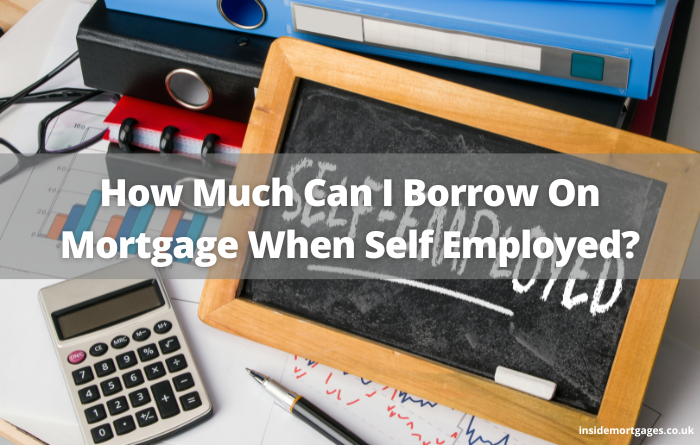How Much Can I Borrow On Mortgage When Self Employed?
Whether you are a sole trader or a company director for a limited company, if you are self-employed, you might be wondering how much you can borrow for a mortgage.
So how much can you borrow if you’re self-employed? It really depends on a number of factors but in general, the answer is “it depends.” If you have a steady income and low debts, you should be able to qualify for a decent-sized loan. But if you’re just starting out or your income is erratic, it may be tough to get approved for much more than a small loan.
In either case, a mortgage lender will assess your suitability based on your self employed take home earnings, value of the property, credit history, debts and type of mortgage you’re interested in.
Read on for more information that will help self employed borrowers understand their options when it comes to submitting their self employed mortgage application.
How Much Can I Borrow For A Mortgage If Self Employed?
The amount you can borrow will depend on a number of factors, including:
- Your income – Lenders will want to see proof of your income to assess how much you can afford to borrow. They’ll usually take into account your salary, any dividends you receive, and any other sources of income.
- Your outgoings – Lenders will also want to know about your current outgoings, such as your rent or mortgage payments, credit card debts, and other financial commitments. This is to assess how much you can afford to repay each month.
- The value of your property – Lenders will usually lend you a maximum of 4.5 times your annual income. However, this may be less if you’re self-employed or if the value of your property is low.
- Your credit history – Lenders will check your credit score and record to see if you’ve had any financial problems in the past. This is to assess how much of a risk you are to them.
- Your employment status – Lenders will want to know if you’re employed or self-employed. This is because self-employed people are considered to be higher risk.
- The type of mortgage you choose – The type of mortgage you choose will also affect how much you can borrow. For example, interest-only mortgages usually have lower borrowing limits than repayment mortgages.
To find out how much you could borrow, speak to a mortgage advisor. They’ll be able to assess your financial situation and advise you on the best mortgage for your needs.
How Do You Prove Your Income If You’re Self-Employed?

Any self employed person looking for a mortgage will follow exactly the same process with a lender or mortgage broker as employed people. The only difference is the type and quantitiy of information that they will need to provide to prove their income so that the lender to assess their mortgage affordability.
If you’re self-employed as a limited company director or sole trader, you’ll need to provide different documentation than someone who is employed by a company.
To assess your income, a lender will request:
- Your self assessment tax return and tax summary documents for the last two or three years’
- Your business’s most recent legal accounts show income, profits, and legitimate business expenses
- A profit and loss statement for your business showing a breakdown of cash into and out of your business to show your net profit
- Bank statements for your business
These documents will give the lender or mortgage brokers you’re working with, a clear idea of your business’s financial situation and allow them to assess how much you can afford to repay each month.
What Type of Mortgage Can I Get If I’m Self-Employed?
There are plenty of different types of mortgages available, even for self-employed people. The most common are:
- Fixed rate mortgages – These have an interest rate that stays the same for a set period of time, usually two, three, or five years. After this, the rate will usually revert to the lender’s standard variable rate (SVR).
- Tracker mortgages – These follow the Bank of England base rate, plus a set percentage. For example, if the base rate is 0.5% and your tracker mortgage has a rate of 2%, your interest rate will be 2.5%.
- Discounted rate mortgages – These offer a discount off the lender’s SVR for a set period of time. For example, if the SVR is 4% and your mortgage has a discount of 1%, your interest rate will be 3% for the discount period.
- Capped rate mortgages – These have an interest rate that’s no higher than a certain amount, even if the lender’s SVR goes up. For example, if the SVR is 4% but your mortgage has a cap of 2%, your interest rate will never be higher than 2%.
- Interest only mortgages – These require you to make monthly payments that only cover the interest on the loan. You won’t reduce the amount you owe during the mortgage term and will need to find a way to pay off the capital at the end.
- Repayment mortgages – These require you to make monthly payments that cover both the interest and some of the capital. This means you’ll gradually reduce the amount you owe over the mortgage term and build equity in your home.
What Happens If My Income Goes Down When I’m Self Employed?
If your income decreases while you’re self-employed, it’s important to speak to your mortgage lender as soon as possible. They can offer mortgage advice and may be able to offer you a repayment holiday or switch you to an interest-only mortgage if they think it’s affordable.
If your income decreases significantly, you may find it difficult to keep up with your repayments. In this case, you may need to consider selling your home or renting it out to cover the costs.
I Am Self Employed – What Else Do I Need to Know?
If you’re self-employed, there are a few other things you need to be aware of when applying for a mortgage and you’ll need to provide your latest year’s company accounts or personal Self Assessment tax return as a minimum.
- Your business must have been trading for at least two years. This is because lenders want to see a consistent track record of income before they’ll offer you a mortgage.
- You may need a larger deposit. This is because self-employed people are considered to be higher risk by lenders. As a result, you may need to provide a deposit of 20% or more.
- You may have to pay a higher interest rate. This is because self-employed people are considered to be higher risk by lenders. As a result, you may have to pay a slightly higher interest rate than someone who is employed.
- You’ll need to provide proof of your income. This is because self-employed people often have fluctuating incomes. Lenders will want to see your most recent tax return or accounts to get an idea of your expected income.
- You may need a guarantor. This is because self-employed people are considered to be higher risk by lenders. As a result, you may need to find someone who is willing to guarantee your mortgage payments if you can’t afford them.
How Are Self Employed Earnings Calculated

One of the biggest factors in how much self employed people can borrow from a mortgage lender is how much they earn. In general, lenders offering a self employed mortgage will look at your income and company accounts in one of two ways.
The first is to take your average income from the last two years and use that to determine how much you can borrow. The second is to use your most recent year’s income as a starting point, and then make some adjustments based on factors like expected income growth or seasonal variation.
Which approach a lender takes to assessing your self employed income will usually depend on how long you’ve been self-employed. If you’ve only been self-employed for a year or two, they’re more likely to use your average income from the last two years. But if you’ve been self-employed for longer, they may be more willing to use your most recent year’s income as a starting point.
Specialist Lenders For The Self Employed
Being self-employed has many benefits. You are your own boss, you can choose your own hours, and you get to be in control of your own career but on the flip side, self-employment can also make it more difficult to get a mortgage.
Many lenders require proof of a steady income, and self-employed workers often have difficulty providing this type of documentation. Fortunately, there are a number of specialist lenders who offer mortgage products specifically for the self-employed and sole trader mortgages.
These lenders understand the unique challenges that self-employed workers face and can offer flexible solutions that meet their needs. They appreciate that income can fluctuate and as a result, they’re typically more willing to work with self-employed borrowers to find a loan that meets their needs.
Self Employed Mortgage Lenders
There are a number of specialist self employed mortgage lenders in the UK, who can offer self employed mortgages. This includes most lenders on the high street including banks and building societies, as well as a number of smaller, specialist lenders who support those with self employment income.
Some of the best known self employed mortgage lenders in the UK include:
· Lloyds Bank
· Halifax
· Barclays
· HSBC
· RBS/NatWest
· Santander
Where you might require a more specific deal from a more specialist lender is if you are unable to meet the usual criteria. For example, those who are newly self-employed and only have one full year of accounts. It is still possible to get a mortgage but a broker may be able to recommend the providers most likely to approve you.
It’s worth shopping around to compare different self employed mortgages before you apply for a loan. Different lenders will offer different interest rates and terms, so it’s important to compare the options to find the most appropriate lender for you.
You can compare self employed mortgage options online using a comparison website like MoneySuperMarket. Simply enter a few details about yourself and the type of loan you’re looking for, and the website will show you a list of deals from different lenders.
You can then compare the interest rates, fees and terms of each loan to see which one is the best for you. Once you’ve found the right deal, you can apply for the loan online or over the phone.
The Process For Self Employed Mortgage Applicants
Applying for a self employed mortgage is similar to applying for any other type of mortgage. For anyone whos part of a company or are sole traders, you too, will need to fill in an application form and provide evidence of your income, as well as proof of your identity and address.
Get started with a self employed mortgage calculator to get an idea of what you could borrow before approaching a whole market or specialist mortgage broker.
- It’s important to be honest when you’re applying for a self employed mortgage. Lenders assess your tax returns, business accounts and financial records carefully to verify your income, so if you try to overstate your earnings you may find it difficult to get approved for a loan.
- Once you’ve submitted your application, the lender will carry out a credit check to see if you’re eligible for the loan. They will also assess your affordability, to make sure you can afford the repayments on the loan.
- If your application is successful, the lender will offer you a mortgage in principle. This is a formal offer of a loan, which is based on the information you provided in your application.
- You don’t have to accept the mortgage in principle, but it can be useful if you’re looking to buy a property soon. It can also give you an idea of how much you could borrow from the lender, and what interest rate they would offer you.
- Once you’ve been offered a mortgage in principle, you can start looking for a property to buy. When you’ve found a property you want to make an offer on, the lender will carry out a valuation of the property to make sure it’s worth the asking price.
- If the valuation is successful, and you meet the lender’s other criteria, you will be offered a formal mortgage offer. This is a legally binding document that sets out the terms and conditions of your loan.
- You will then have a few weeks to decide whether or not to accept the offer. If you decide to go ahead with the loan, you will need to provide the lender with proof of your income and sign the mortgage contract.
- The lender will then arrange for the money to be paid into your bank account, so you can complete the purchase of the property.
Tips for increasing your chances of getting approved for a mortgage loan when you’re self-employed
There are a number of things you can do to improve your chances of mortgage approval.
- Make sure your credit file and bank statements are accurate well ahead of your mortgage application to show that you can afford the mortgage repayments.
- Reduce unnecessary spending, streamline household bills, don’t use payday loans and live within your means. These are all positive indicators for lenders when assessing a self employed applicants credit rating and suitability.
- Consider applying for a joint mortgage. The affordability will be based on the combined earnings of both people, so this could boost your approval rating if your earnings are particularly low or erratic. You must remember you will be jointly responsible for the full amount of the loan, so if your earnings can’t cover the mortgage on their own, you should take out insurance that could make up the shortfall if needed. You should also only apply for a joint mortgage with some with a good credit score as you will be financially linked to them, and their spending habits could impact your rating in the future.
- Save up a larger deposit – this will reduce the amount you need to borrow and therefore the monthly repayments, making it more affordable for lenders. It will also give you access to a wider range of mortgage deals, as some require a minimum deposit of 10% or more.
- Think about using a guarantor – if you have a family member or friend with a good credit rating who is willing to act as a guarantor on your mortgage, this could improve your chances of approval. The guarantor will be responsible for making the repayments if you can’t, so it’s a big commitment for them.
- A proven track record of staying in credit, paying bills on time, and having low debts will all work in your favour when being assessed against lending criteria.
- Get expert help – speaking to a mortgage broker who specialises in self employed mortgage applications can give you an idea of which lenders are most likely to approve your application. They will also be able to help you put together a strong application.
- When it comes to remortgaging, it’s common to wonder if you should use the same lender. Whilst it makes sense to get a quote from your existing lender, you should always check the whole of the market when remortgaging as you can often borrow more and save thousands by switching.
Summary
Applying for a self employed mortgage can be more complex than applying for a mortgage with employed status due to the fluctuation in earnings that is common for most people who work for themselves but it’s very achievable to get a good mortgage deal.
Despite this, there are plenty of things you can do to improve your chances of mortgage approval. With careful planning and expert advice, you should be able to find a self employed mortgage that meets your needs and is affordable.

